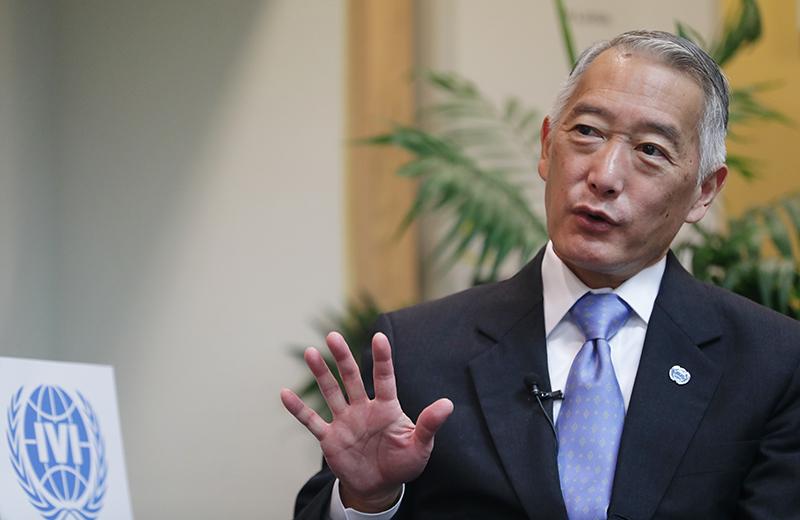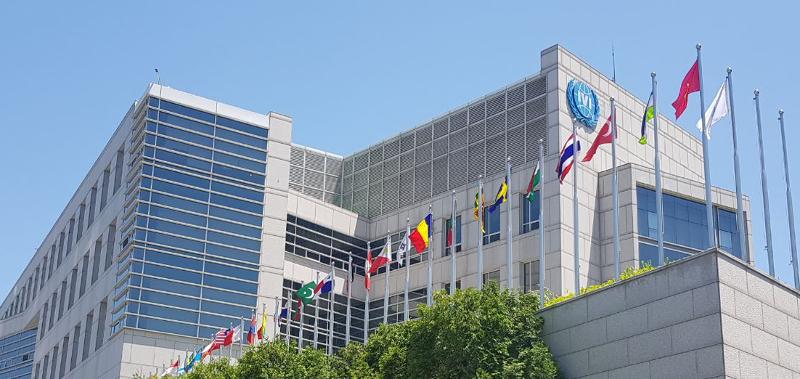
Jerome Kim, director general of the Seoul-based International Vaccine Institute (IVI), on May 25 discusses the progress in developing a vaccine for the novel coronavirus disease (COVID-19), stressing the importance of international cooperation. (Kim Sunjoo)
By Lee Hana and Kim Minseok
Seoul | May 25, 2020
Several months into a pandemic that has affected the lives of millions, the Seoul-based International Vaccine Institute (IVI), an international organization dedicated to developing and delivering vaccines for global health, provides major support to labs racing to develop a vaccine against the novel coronavirus disease (COVID-19).
"There are now close to 150 vaccines being developed, but eight are at the stage of human testing," said IVI Director General Jerome Kim on May 25 in an interview with Korea.net.
"When we're dealing with a pandemic like this, it's important to remember that this is a race to get a safe and effective vaccine that prevents the transmission of COVID-19 to other people, not a race among U.S., European or Chinese companies."
He added, "We are stronger and faster when we work together than when we work separately."
At IVI headquarters in southern Seoul, the director general discussed how countries like Korea, the U.S. and China are collaborating with the European Union, the Coalition for Epidemic Preparedness Innovations (CEPI) and the World Health Organization to bring an end to the pandemic.
The following are excerpts from the interview.

The International Vaccine Institute (IVI) is headquartered in Seoul. The non-profit international organization was established in 1997 under an initiative of the U.N. Development Program. Korea and the World Health Organization are among the 36 signatories to its global treaty. (IVI)
- The IVI has a partnership with CEPI, a foundation that funds several programs to develop a vaccine. How has CEPI been involved?
Shortly after China published the virus sequence for SARS-CoV-2 (the coronavirus), CEPI put out a call for proposal for vaccine development, asking companies to get a vaccine out in four months. Three companies -- Moderna and Inovio (U.S.) and CureVac (Germany) -- and Queensland University (Australia) came forward and were funded.
At least two of those companies now have products entering the second phase of testing, just 4 1/2 months into the epidemic. In vaccine development, that's extraordinary speed that speaks to how CEPI can use its tools for outbreak diseases like SARS, MERS, lassa fever and nipah virus disease and extend them very quickly to an unknown disease, in this case COVID-19.
- How many COVID-19 vaccine candidates are under development?
It's probably close to 150 right now. Eight vaccines are actually being tested on humans, several of which have gone on to Phase 2 of testing.
Some of those funded early by CEPI includes a DNA vaccine from Inovio, an RNA vaccine from Moderna, and two vector vaccines (made in a genetically modified adenovirus) from a Chinese company and Oxford University.
- Vaccines usually take 5-10 years to develop, but experts on COVID-19 have estimated a timeline of 12-18 months. How is this possible?
Five to 10 years assumes that things are moving one after the other, with extra time to go back and fix things. If you're a company that wants to make a vaccine and have a regimen that's precisely tuned, you'll spend some time optimizing.
In this case, though, we're going to overlap the phases. Phase 1 will start, then Phase 2 will start with the first still running. Phase 3 will start while the second is still running. What we'll know is that the vaccine generates the correct protective responses and we'll be collecting safety info throughout the trials. So we'll be increasing the safety information we have. By the end of Phase 3 – perhaps a result will come 12 months from now – we'll know that the vaccine protects against infection and is safe. We'll continue to collect safety info after that, but it's important to know that the vaccine works.
- How will COVID-19 end? Will it end soon?
I believe that for COVID-19, we will have a vaccine. The reason I say that is it's easier than HIV, which we've been working on since 1985. I think that for COVID-19, it could be slightly easier to develop an overall vaccine. The reason is that with a typical vaccine, like for hepatitis A, when a person gets infected with it, the body's reaction to the virus eventually controls the virus and then eliminates it, protecting the body against future infection.
With COVID-19, we think that when you have an infection, the protective response manages to eliminate the infection and prevent re-infection. We're not absolutely sure but there's data to suggest that's true in monkeys. If you expose a monkey to COVID-19 infection, it's immune from reinfection. The Korean government was conducting a study to look at the reinfection question, and it looks like people weren't able to transmit after that. So that would be pretty good evidence that we can produce a vaccine that does the same thing.
hlee10@korea.kr